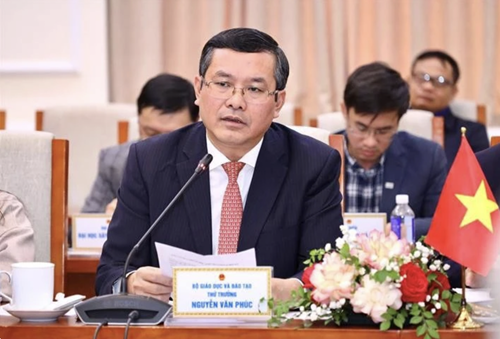At a working session with representatives from 21 U.S. higher education institutions in Hanoi on March 31, Phuc highlighted the growing educational partnership between the two nations, with 30,000 out of 200,000 Vietnamese citizens studying abroad being in the U.S.. In the 2022-2023 academic year, Vietnamese students ranked fifth globally in terms of numbers of international students in the U.S., rising by 5.7%.
    |
 |
|
Deputy Minister of Education and Training Nguyen Van Phuc at the working session with representatives from 21 U.S. higher education institutions in Hanoi on March 31 (Photo: Ministry of Education and Training) |
Over the recent past, the two countries have signed agreements and Memoranda of Understanding on education cooperation in digital transformation, English language teaching in education establishments, and improvement in education quality, among others.
He emphasized digital transformation as a strategic priority for Vietnam's education sector, aiming to revolutionize teaching methods and make digital learning an essential daily activity for educators and students alike.
Phuc outlined key focus areas beyond infrastructure upgrades, including teacher training, STEM/STEAM education development, programming education, and computer science programs to enhance digital skills and cybersecurity awareness. These initiatives aim to develop a high-tech workforce, especially in fields like big data, artificial intelligence, and semiconductor technology.
Commercial Counsellor at the U.S. Embassy in Vietnam Steve Green, who led the U.S. delegation, said that the U.S. has nearly 4,000 universities and colleges serving some 20 million students, with private institutions comprising over 50% of higher education institutions.
He noted that since late 2024, the U.S. Department of State has collaborated with Vietnam's Ministry of Education and Training to invite 25 leaders from Vietnamese universities specializing in science and technology to participate in the International Academic Partnership Program (IAPP), focusing on strengthening cooperation in technical fields such as AI, information technology, and semiconductor chips.
At the event, representatives from universities of both countries exchanged notes on training programs, scholarships, international students, and development of professions that meet emerging social trends and needs.
Currently, about 50 of the 400 joint training programs between Vietnamese and U.S. higher education institutions on technology engineering, computer science, and economics. Additional direct cooperation exists in science and technology, environment and climate change, agriculture, and STEM education.
Since 2009, the Ministry of Education and Training sent 127 doctoral students to the U.S. using state budget funding. Meanwhile, about 30,000 Vietnamese students are studying in the U.S. through various scholarship programs or self-finance.
Vietnam currently hosts six U.S.-invested educational institutions in Hanoi, Ho Chi Minh City, Quang Ninh, Hai Phong, and Binh Duong, with some 3,000 students enrolled.
Source: VNA